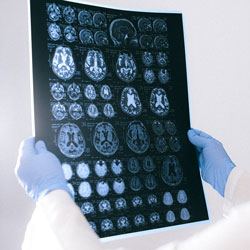Understanding the Progression of Alzheimer’s Disease

Watching a loved one struggle with Alzheimer’s disease can be challenging. There is no way to predict how quickly or slowly the disease will progress or exactly how it will affect someone’s cognitive abilities. There is no way to prevent Alzheimer’s, and there is currently no cure, so one of the best things you can do is educate yourself on how the disease progresses in order to better support your loved one and their needs.
The Alzheimer’s Association estimates that more than 6 million Americans are living with Alzheimer’s disease, and this number will only continue to grow. Although it is most prevalent in people aged 65 and older, there have been cases of people in their 30s or 40s with the disease. It is a progressive condition that is typically broken down into four stages:
- Preclinical Stage
The brain can begin developing signs of Alzheimer’s disease long before any symptoms are noticeable. The only way you would know if a loved one was in this stage was if they had a brain imaging scan. This stage can last for years before symptoms progress.
- Early Stage (Mild)
Seniors with early-stage Alzheimer’s continue to live independently and do many of their normal tasks. They can often still work, drive, and make decisions for themselves. However, you may notice that they have some mild cognitive decline that could include:
- Forgetting people’s names.
- Trouble recalling recent events.
- Difficulty finding the correct word.
- Misplacing objects.
- Challenges with planning or organization.Keep in mind that these symptoms do not always indicate Alzheimer’s, but they can be warning signs. Occasional forgetfulness happens to everyone, but when it become more frequent, that can be concerning. Now can be a good time to get your loved one’s legal and financial affairs in order, such as creating a living will or designating a power of attorney, while they can still make sound decisions.
- Middle Stage (Moderate)
At this point, memory problems become more pronounced. Your loved one may become more frustrated with not being able to find the right words, remember people, or recall what they were doing. They may become confused about where they are or the date.Many seniors require more assistance to remain independent and safe. Your aging parent may benefit from an in-home care provider who can help them prepare meals, tidy up their home, get dressed, remember to take their medication, and accompany them on errands. It is not unusual for seniors to experience changes in their mood or behavior as their Alzheimer’s progresses.
- Late Stage (Severe)
Once Alzheimer’s disease becomes severe, your loved one may need around-the-clock care. They may have lost their ability to control their bladder or maintain their personal hygiene. They may need help eating, walking, or doing other tasks. When it comes to their cognitive function, they may not be alert and oriented much of the time and have trouble recognizing family and friends. Eventually communication can become frustrating and challenging.However, just being with them and engaging in activities you know they enjoy can be comforting and relaxing. You can still spend time with them listening to soothing music, looking at old pictures, and telling them about things that are going on, even if they do not respond.
Since the timeline for Alzheimer’s disease can be unpredictable, the best you can do is make sure your loved one’s needs are met and enjoy your time together. Partnering with an in-home care provider like Always Best Care can allow them to remain as independent as possible for as long as possible and stay in the comfort of their own home while it is safe. Learn more about how Always Best Care can support individuals with Alzheimer’s disease by contacting us at (855) 470-2273 to schedule a free consultation.





